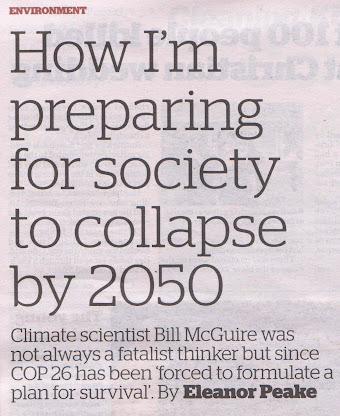Professor Bill McGuire of UCL is the go-to expert for discussion of volcanoes and earthquakes and the likelihood of their adverse effects. However, he has wider interests and has published a book entitled Hothouse Earth: An Inhabitant’s Guide (that I have not read) that formed the basis of an article by Eleanor Peake that appeared in the i newspaper (see above). Several sections of the article are worth quoting:
In 27 years, society as we know it will have collapsed. Food will be extremely limited. Lawlessness will have taken over the land. Gangs will roam the countryside scavenging for resources like food, water and fuel. This breakdown won’t be sudden. It will happen over a period of months. It might even have already begun..
..[McGuire} is expecting, and preparing for, widespread riots by 2050. The riots will begin, he says, as they have throughout history, when we run out of food..
..“If we are going to see the collapse of society and the economy, then it’s going to be unbelievably hard for everyone, it’s going to be a Wild West,” he says. “If society collapses, there will be nobody to keep on top of the water supply, nobody to stop gangs roaming the countryside.”..
..”If we are to have any chance of survival, we need to co-operate; I think that’s absolutely critical.”
That is a very bleak view, but one that is believable - so, how do we achieve co-operation? No-one wants the catastrophe of 2050 predicted by McGuire, and the solution lies with us turning our backs on the comfort, complacency and economic growth that we favour in the developed countries and that is an increasing feature of some developing economies. How can this be achieved?
In the Gettysburg address of 1863, Lincoln lauded “government of the people, by the people, for the people” and this strikes me as being a good basis for organising our societies. Top-down democracies now appear to be based on gaining votes among the electorate rather than focussing on governance, especially where that needs to be long-term. Unfortunately, the challenges facing us, the ones that McGuire is highlighting, are based on much longer periods of time than the duration of elected parliaments. Solutions also require changes in the way that most international economies function, with the power of “markets” dictating everything. Add to this our seeming desire for a steadily increasing standard of living and one can see why we have the current approaches of politicians, based on what Greta Thunberg so admirably describes as “blah, blah, blah”. Of course, in common with many other voters (almost all?), I am a hypocrite in realising that global climate change provides severe challenges down the line, yet my lifestyle is based on the comfort and complacency I mentioned earlier. However, I would like to change the system to be more like Lincoln’s ideal, as this would be helpful in the long term - but how is this to be achieved? Firstly, one has to overcome top-down approaches and how is that to be done when we have a well-established political class, political parties, and a complex media network to propagate their views. A first move towards democracy would be achieved by having the choice “none of the above” on ballot papers, as we do in many surveys. Imagine!
Another fundamental in looking at the future, and this is one that McGuire alludes to, is our need to understand that humans are part of a much wider living system and that we are as dependent on all the parts of the living planet as we are on each other. We haven’t moved from the Biblical standpoint that the environment is ours to exploit and there are many who feel that the negative consequences of our exploitation will be reduced by the implementation scientific discoveries, both now and in the future. Good for the optimists that have that view, but it does point again to an attitude that we are able to control matters and we clearly cannot.
If we were
less anthropocentric, and had more respect for the wonders of the natural
world, we could shape new ways of integrative thinking. Coupled with a
bottom-up approach to democracy, we could transform the future for all citizens,
but will it be allowed to happen by those currently holding political and
economic power? No. That’s a sad fact, but those who do respect natural history
(and, incidentally, those who believe that good manners and mutual respect are
among the highest human achievements) are among our most valued citizens. If
their approaches spread, we may get closer to a real democratic system like
that admired by Lincoln who wished that “government of the people, by the people, for the people”
should not “perish from the earth”. Well it has done, hasn’t it?

No comments:
Post a Comment